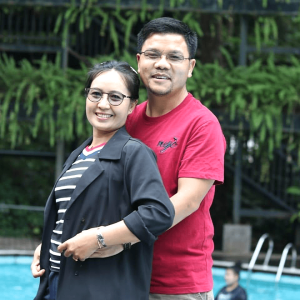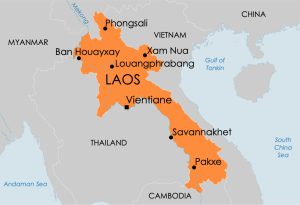 Pastor Thongkham Philavanh (40) was shot by a masked gunman at his home in Vanghay village, Oudomxay province on 22 July. His wife Sengdala (pictured with him) took him to the local hospital but he was pronounced dead on arrival.
Pastor Thongkham Philavanh (40) was shot by a masked gunman at his home in Vanghay village, Oudomxay province on 22 July. His wife Sengdala (pictured with him) took him to the local hospital but he was pronounced dead on arrival.
Pastor Thongkham was a member of the Khmu ethnic group in northwest Laos, where he was provincial chair of the Lao Evangelical Church (LEC). He took over the role of pastor from his father-in-law Dok, who was imprisoned for 13 years because of his faith.
Pastor Thongkham was active in evangelism, showing the Jesus film and training pastors. He and Sengdala helped to plant house churches, which have grown hugely in just a few years. They were known for their love for young people, many of whom would gather at church or in their house for discipleship and Bible studies. A week before the pastor was killed, LEC leaders gathered to dedicate the extension of the church building, necessitated by church growth.
Local Christians said Pastor Thongkham had been closely monitored by the authorities and had been warned several times to stop his Christian activities. Police had even summoned the pastor and his wife to the village chief’s office and asked them to sign a document renouncing their faith, but the chief reportedly stopped the police and defended Thongkham and Sengdala, saying they were role models in the community.
After her husband’s death Sengdala said that he knew his life was in danger and that for the past year he had been telling her to be prepared. “He did not disclose everything that was happening,” she said. “He kept most of the burdens to himself because he wanted to protect us. He sacrificed himself to protect his family.”
Attack
Pastor Thongkham had just returned home from a ministry visit at around 8 pm on the evening of 22 July when two men in suits and facemasks arrived at his house on a motorbike and walked the back, where the pastor had gone to feed his chickens and ducks. He went to greet them, thinking they were visitors, but one of the gunmen fired seven shots into his head and body in front of Sengdala. The gun was fitted with a silencer and the attackers escaped while she was rushing her husband to hospital.
Sengdala later said, “I am not sure why they killed him, but I believe that it must be because he serves Jesus Christ. One thing that I am sure of is that there are some groups of people who dislike what Thongkham does as a Christian pastor.”
A local Christian told Radio Free Asia that it appears that Thongkham was killed because he was a Christian pastor, while a member of the LEC said anti-Christian groups in Laos are seeking opportunities to harm Christians.
At Pastor Thongkham’s funeral on 27 July, which was attended by hundreds of people, another pastor commented, “This was as if a warning from whoever. They kill the leader to scare the members.”
Pastor Thongkham leaves his wife Sengdala and their teenage son and daughter, plus many foster children who received refuge in the couple’s loving home.
Police are investigating the incident, which is the latest of many recent cases of persecution of Lao Christians. In June 2024 six Christians were arrested (including church leader Pastor Mum) at Tahae village in Khammouane province. They belong to an unregistered church that meets in the pastor’s home and were arrested at the request of their village chief and imprisoned for a month.
In February 2024 a church building in Kaleum Vangke village in Savannakhet province was destroyed by order of a village elder, despite the Ministry of Home Affairs having granted the church the right to gather.
In October 2022 the body of Pastor Sy Seng Manee was found at the edge of a forest in Khammouane province, showing signs of torture. The pastor had worked with the LEC and village authorities had warned him to stop his religious activities. The case remains unsolved and his killers are still at large.
Background
 Laos’ population of 7.9 million people is approximately 65 percent Buddhist, with 31 percent animist or non-religious, and there are around 200,000 Christians. The Communist government recognises Buddhism, Christianity, Islam and the Baha’i faith, but gives priority to Buddhism (which is often blended with animism) and closely monitors all religious activity.
Laos’ population of 7.9 million people is approximately 65 percent Buddhist, with 31 percent animist or non-religious, and there are around 200,000 Christians. The Communist government recognises Buddhism, Christianity, Islam and the Baha’i faith, but gives priority to Buddhism (which is often blended with animism) and closely monitors all religious activity.
The government at national and local level strictly regulates religious groups and requires them all to register with the Ministry of Home Affairs (MOHA), which is slow to respond to applications. Even when the MOHA grants legal status it is often ignored by state and district officials in remote areas.
The church has grown rapidly in recent years and has increasingly attracted opposition from those who view Christianity as a Western religion and fear it will interfere with local worship of idols and spirits. Persecution of Christians has increased, especially in remote areas, although conditions vary between provinces, and the country is ranked in the “significant persecution” category in the Church in Chains Global Guide.
The Lao constitution guarantees religious freedom and 2019’s Law on the Evangelical Church grants Christians the right to practice their faith, but Christians say this is often ignored in rural areas where they face opposition and even violence from relatives or local officials who sometimes evict them for refusing to renounce their faith, confiscate their property and even burn their homes and rice silos. Christians are sometimes arbitrarily detained by local authorities, held for a short period and then released.
The Lao Evangelical Church, which is one of three officially-recognised denominations along with Roman Catholics and Seventh-day Adventists, has many congregations but most do not have church buildings and meet in houses.
(Barnabas Aid, Christian Solidarity Worldwide, Church in Chains Global Guide 4th Edition, Human Rights Watcher for Lao Religious Freedom International Christian Concern, Morning Star News, Open Doors, Radio Free Asia, Voice of the Martyrs Canada)
Photo: Morning Star News/Facebook
Map: Church in Chains Global Guide 4th Edition
